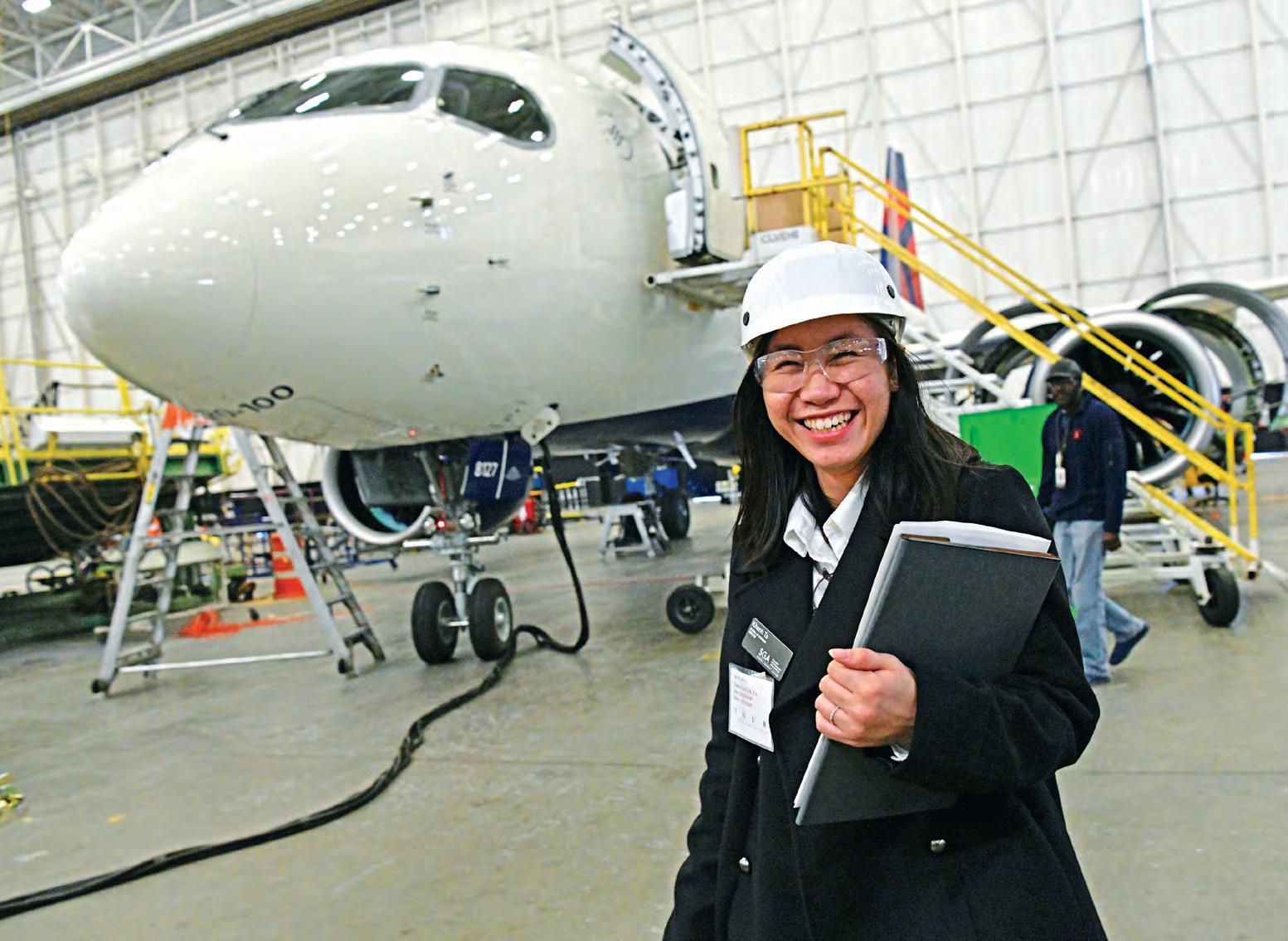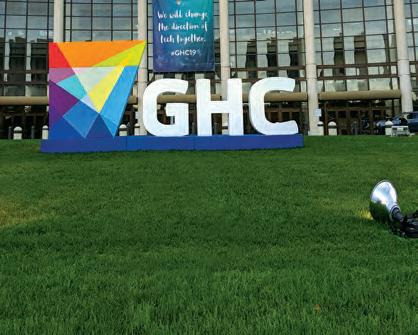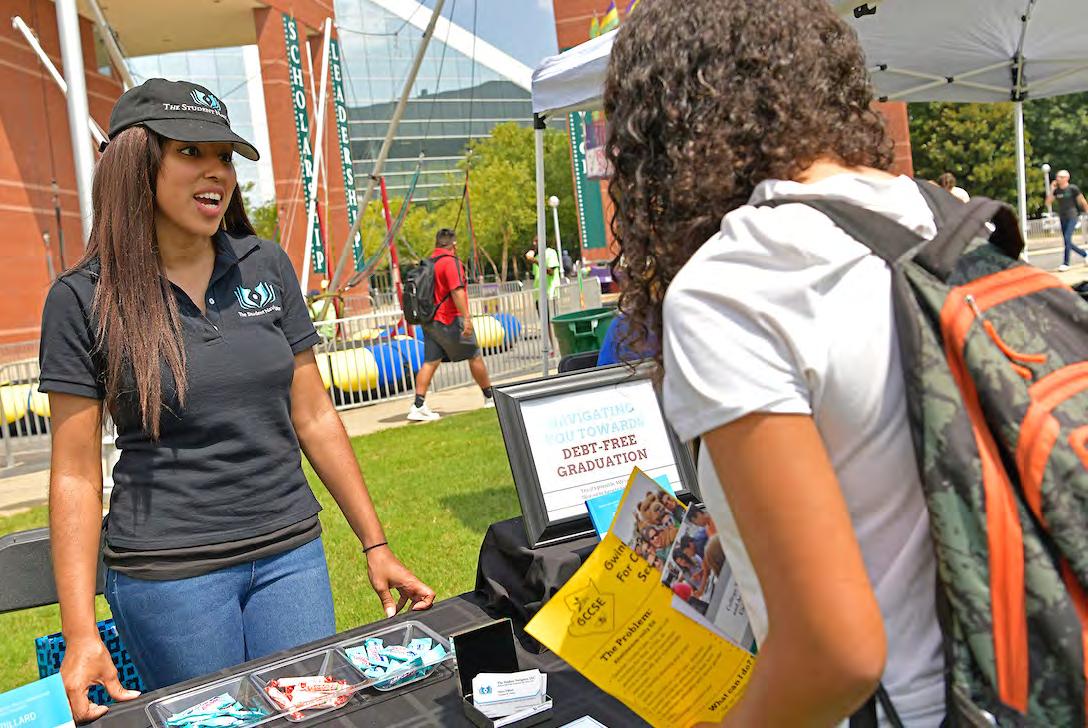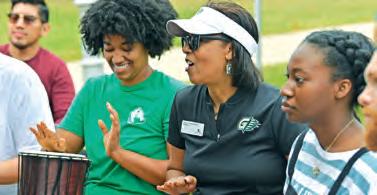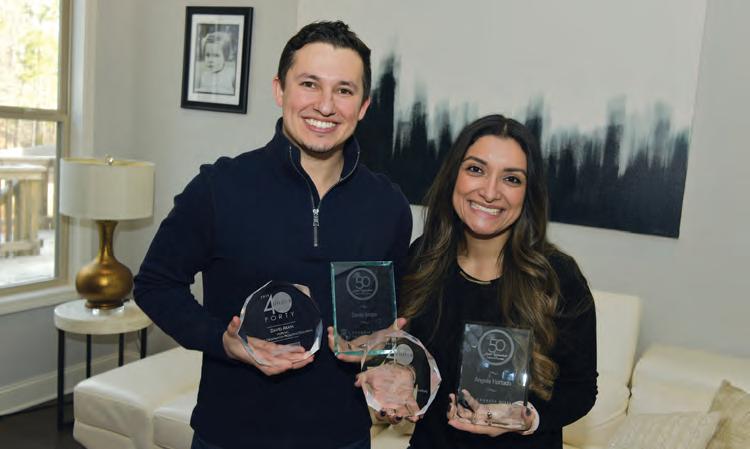
7 minute read
Scholarship
Shown here and opposite, Gabriella Tyler, ’20, biology, prepares to examine a zebra fish involved in her Parkinson’s Disease research in the Strickland Research Laboratory.
T Y L E R O V E R C O M E S A D V E R S I T Y T O
DISCOVER HER
HER
Every time life knocked her down, she got back up again.
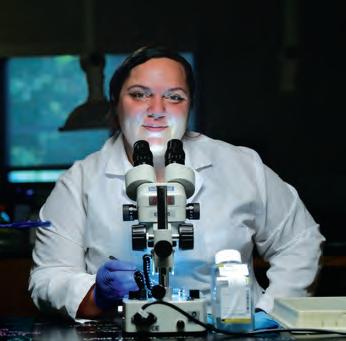
or most of her life, Gabriella “Bella”
Tyler’s dream was simply to survive. Growing up in foster care in California, she didn’t really have a support system. At 15, she was emancipated from the foster care system and given only $1,000 to set out on her own. She tried to stay in school, but because she had to work to support herself, she dropped out. Over the next several years, Tyler experienced periods of independence and homelessness. She moved to North Carolina, where she had a successful career in automotive sales until the Great Recession caused sales to slump. Homeless at 22, she found herself sleeping outside a library one night. Libraries had always provided her a sanctuary. Naturally a broad-minded and curious person, she spent many hours in libraries, sometimes reading every book on a randomly chosen shelf to pass her free time. But on this night in 2011, being near a library made her reflect on what she wanted out of life. Tyler became determined to get an education. The next morning, she went to a local community college to ask how to enroll and was told she had to first earn her GED. All those years spent in libraries paid off, as she passed her GED placement test in the 98th percentile, earning the program’s “scholar graduate” status. “I still had to put in a minimum number of hours studying something, so they told me to just read some books,” Tyler said. “Two and a half weeks later, I had my GED.” Her first semester in community college didn’t go well. Tyler had to get a job, find a place to live, get a loan, buy a car and adjust to college demands.
continued on next page >
D R E A M S
continued from page 9
“I had to work to support myself, but I couldn’t make it to class because of my job,” she said. “I didn’t know how college worked, so I didn’t know how to withdraw. I failed every class.” Once settled, she achieved a 4.0 the next semester. However, she was then sidelined by an emergency appendectomy and a subsequent, life-threatening infection that lasted six months. With college on hold, Tyler worked as a ranch hand and a farrier. She also worked at an auction house, using the connection to buy antique furniture she sold through her own business. “I was just trying to survive,” she said. Life dealt her another blow when she came home one evening to find that her roommate had suddenly moved out, stealing Tyler’s few valuables. A man then came to the door, claimed her roommate owed him thousands, and threatened Tyler’s life if she didn’t pay off her roommate’s debt when he returned. Tyler immediately packed up and fled to a friend’s home in another city. Due to a sudden and severe radiator leak, it took five hours to make the 60-mile trip to safety.
– Gabriella Tyler, ’20
The next morning, she discovered that her vehicle had been stolen, and with it, all of her clothes and other belongings. “It was the worst day,” she said.
Biology majors Martin Penaherra Merizalde,’21, Hannah Staley,’19, Kyra Brewer,’19, Gabriella Tyler,’20, and Vincentiu Olteanu,’20, all made research presentations at the 2019 Annual Biomedical Research Conference for Minority Students in Anaheim, California. Photo courtesy of Tyler.
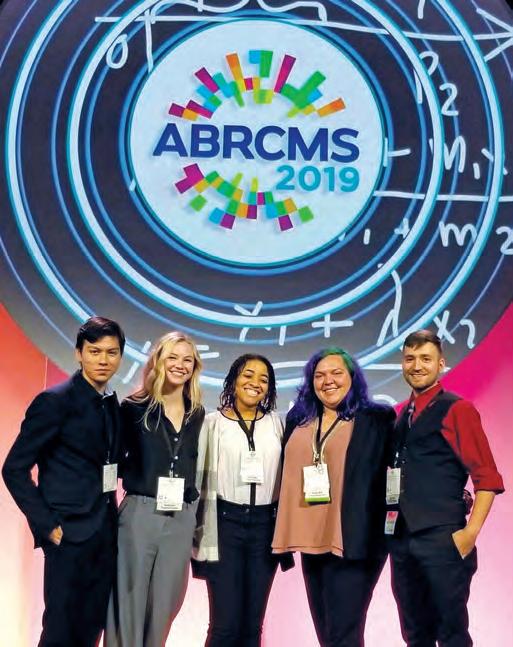
Although Tyler had to deal with the legal aftermath of her roommate’s actions, things soon changed for the better. She got a job at a call center and was quickly promoted to supervisor. She also met and married her husband. In 2016, the couple moved to his home state of Georgia, settling in Sugar Hill. Tyler got a job as a private security guard at the Country Club of the South in Johns Creek, where she regularly encountered its wealthy and famous residents. “One resident became a friend and encouraged me to go back to college,” Tyler said. Georgia Gwinnett’s location, accessibility and affordability made it the perfect choice, and Tyler enrolled in the spring of 2017, unsure of her career goals. “I was not ready,” she said of becoming a student again. She discussed her challenges with Dr. Michael Erwin, associate professor of biology, who explained how she was defeating herself. The frank discussion inspired her to change her perspective and to major in biology. Tyler said “everything clicked” in the spring of 2018 when she took a special “BioBridge” course for freshman, sophomore and nontraditional students needing to learn basic laboratory skills. Each student had to conduct a research project.
Intrigued by plant-based medicine and looking forward to a study-abroad trip to Thailand that summer, Tyler chose to research the antioxidant potential of jackfruit and durian, two fruits native to Southeast Asia. Durian is said to taste like chives, garlic and caramel mixed with whipped cream. Its odor is famously overwhelming. “It smells like gasoline-soaked onions,” Tyler said. “I got kicked out of the lab to work with it under a hood in the prep hallway.” The students were required to develop a poster presentation on their research for the spring semester CREATE Symposium, giving them experience discussing the material with a broad audience. This experience came in handy during Tyler’s 29-day trip to Chiang Mai and Kamphaeng Phet Rajabat (KPRU) universities in Thailand. Combined with four weeks of pre- and post-trip work at GGC, the intensive, interdisciplinary excursion combined 16 credit hours in mathematics, statistics and biology courses. The GGC students were invited to a science conference at KPRU involving mostly graduate students from multiple universities in Southeast Asia. However, they learned that they were expected to make a poster research presentation. Fortunately, Tyler had her durian poster file on her laptop and prepared a talk on her research. To her surprise, she won third place among 30 conference presenters. Tyler has since presented her durian research at nine conferences and won honors at two. Planning a career in conducting biomedical research, she knew that presentations, publications and research are needed to augment her academic record so she could gain admittance to a doctoral program in graduate school.
She has done research with three of her faculty mentors, and now works with Dr. Cindy Achat-Mendes, associate professor of biology, on Parkinson’s Disease (PD) research in the Strickland Research Laboratory. PD research at GGC includes investigating nicotine’s apparent protection against the inflammation related to this disease. Tyler is working on a multisemester project using zebrafish to study the neuroprotective effects of nicotine against neuroinflammation and the progression of PD. She also is interested in comparing the effectiveness of a plant-based precursor to dopamine to the lab-produced version of the drug in managing PD. She hopes the work will lead to useful findings and publication of a scientific paper. It has already led to several conference presentations, as well as a national poster presentation at the Annual Biomedical Research Conference for Minority Students. Her college experience also enabled Tyler to build leadership skills. She served as president of the GGC chapter of the Minority Association of Premed Students, which grew significantly in membership and programming under her leadership.
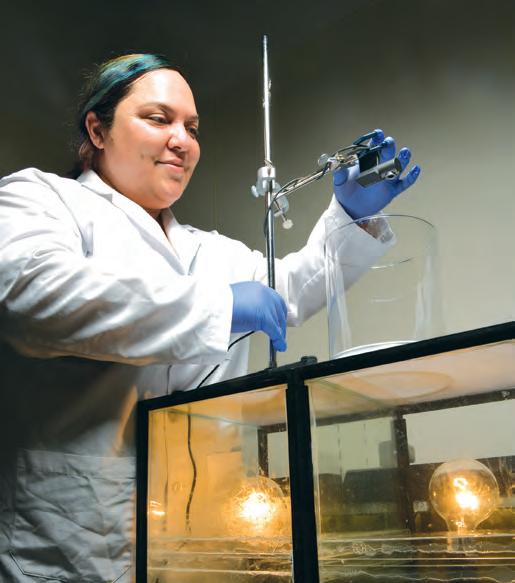
Gabriella Tyler,’20, biology, photographs a zebra fish she has selected from its tank in the Allied Health and Sciences building.
Tyler has come a long way since sleeping outside of that library only eight years ago. After graduating in May 2020, she will begin the neurobiology doctorate program at the University of Notre Dame, on a full scholarship with a living stipend. She credits the support of her multidisciplinary team of GGC faculty mentors who have encouraged and advised her along the way. “They have my back,” she said. “Every one of them has made a real difference for me.” Today, her favorite place to be is in the lab, and she looks to her future with excitement and determination.


